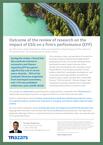
Outcome of the review of research on the impact of ESG on a firm's performance (EFP)
During the review, I found that the academic interest in economics and finance regarding EFP has grown significantly only in recent years. Notably, ~79% of the analysed literature originated from developed economies, and ~71% was published within four years (2019-2022). This indicates a clear concentration of research in developed regions despite the broader global implications of ESG. The review identified three interlinked research areas: business ethics; climate and sustainability; and corporate social responsibility. Interestingly, a keyword cluster analysis identified ‘sustainable development’ and ‘corporate social responsibility’ as preferred research topics, while concepts like ‘sustainable finance,’ ‘ESG disclosure,’ ‘climate change,’ and ‘integrated reporting’ appeared less frequently, indicating potential future research areas.
Uncovering the subjectivity surrounding ESG scoring systems, I question their effectiveness in objectively measuring the positive or negative influence on firm financials and value.
Further complicating matters, finding comprehensive databases publicly reporting ESG scores for small and medium-sized private companies in emerging and frontier markets appears highly unlikely.
My view is that companies should strategically select and integrate impactful ESG elements only, aligning them with their core activities and fostering ethical business practices. This approach, alongside dedicated efforts in corporate finance to maximize shareholder value, can pave the way for a sustainable future.

